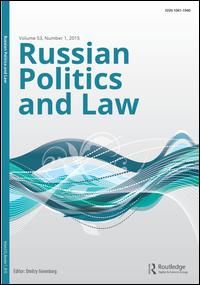(RMR) Yesterday's US airstrikes on the Al Shayrat airfield near Homs seems to have been calculated to allow the Trump administration to appear to be acting decisively without necessarily getting bogged down in a conflict or creating a serious confrontation with Russia. To this end, the Pentagon warned Russian authorities about the strikes ahead of time and Russia did not take any steps to activate its air defenses in Syria. At the same time, by warning Russia, the U.S. government ensured that the strike would have very little effect on Syrian military capabilities. Damage reports indicate that the aircraft that were destroyed at the air base were under repair. Most likely, Russian officials warned the Syrian government that the attacks were coming and any valuable aircraft at the base had time to depart prior to the strikes.
As Vladimir Frolov highlighted just yesterday, the use of chemical weapons by Syrian government forces has placed Russia in a difficult position. Russian efforts to deny Syrian government culpability in the attacks have strained credulity. At the same time, Russian leaders clearly felt that they could not hang Assad out to dry. Assad's goal may well have been to scuttle any chances for peace negotiations to proceed, in order to force his somewhat reluctant Russian ally to agree to an offensive that would culminate in the elimination of rebel forces from their area of control around Idlib. Russia is thus put in a bind, as it can neither give up on Assad nor fully control him.
In this situation, the U.S. airstrikes may help Moscow out of its difficult situation. Russian leaders can now turn the focus away from the chemical weapons attack itself and toward the U.S. airstrikes as a violation of Syrian sovereignty. At the same time, Assad has been put on notice that the U.S. is not going to stand idly by if he persists in using chemical weapons, which may make him more reluctant to take that risk again, eliminating that method of putting pressure on Russia from his toolkit.
All in all, Russia is unlikely to take steps in response to the airstrikes beyond the usual Foreign Ministry protestations, as long as the strikes are a one time demonstrative act, rather than the start of a more sustained U.S. campaign against the Assad regime in Syria. If the United States continues to attack Syrian government forces, on the other hand, that will place Russia in a difficult position, where it has to choose between abandoning its ally and risking a serious military confrontation with the United States. How Vladimir Putin would choose to act in this circumstance is very much unclear. The consequences of forcing Russia into this choice could be very risky.
See the original post at the Russian Military Reform (RMR) blog











